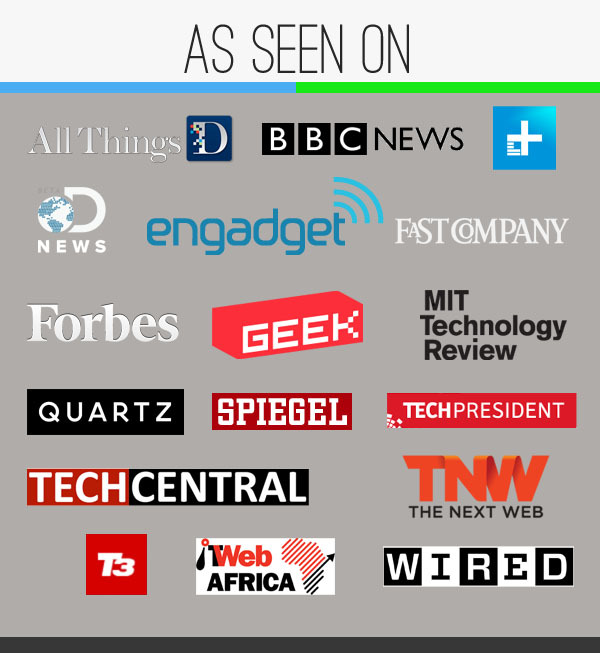Whenever one reads Erik Hersman’s posts about the work that goes on at the iHub, there is no question in my mind about what their purpose is and how profound their impact is on Kenyan and east African, and by extension, African technology innovation is. Read Erik’s latest post on his personal blog about what the iHub has achieved in 3.5 years, and then come back and tell me that you aren’t inspired.
Even more instructive is that none of it is done not in a “oh look at us, we’re so changing the world” kind of way. Erik and the iHub/Ushahidi mafia (if I may) are simply diligent, almost compulsive, about sharing everything. They engage the community, talk about what’s going on, and what problems they are applying their minds to on a near daily basis. The seemingly small stuff clearly adds up over time, but every now and then, the genuinely big stuff just leaps out.
And then we wonder why they are in the news again. And again.
Blogging, not for its own sake, but as a means of carrying the ecosystem along clearly works for the Kenyan technology ecosystem. As an ecosystem, they are incredibly and collectively self aware, because they share. But as a by-product of their sharing, they don’t need to wait for CNN or BBC or Fast Company to write about them. Their story, on their own terms, is out there for the world to see, every day of the week. CNN, BBC and Fast Company go ahead and feature them anyway.
I don’t think anyone goes around asking “just how innovative is the iHub?”. And Erik didn’t need to write a 3.5 year report card to convince us about why tech hubs exist. On the other hand, a lot of very intelligent people, right here in the middle of Nigeria’s technology ecosystem still don’t “get” what the Co-Creation Hub is about, or what they are trying to do. And it’s not because they don’t have an about page. It’s not because the CcHub is all talk either. The iHub has a full 1.5 year headstart on them, but the CcHub has nearly as much going on by way of projects and wins.
Unlike the iHub, however, what the CcHub does is invisible to almost all but the people who work from, or with the CcHub.
So here I am, wondering what way is best to go about convincing Bosun Tijani and the other ogas at the top of CcHub’s rooftop that blogging might be a good way to engage the rest of the ecosystem. But with this attitude, I wonder how far I’m going to get >>>
Conversations are good – so are blog posts but this place is thousand years backward – and desperate for builders!!! Step up and fix things!
— ‘Bosun Tijani (@bosuntijani) July 28, 2013
Let’s get busy folks – CcHUB is an innovation lab and busy enabling ideas to prototypes. If something is missing – STFU and BUILD IT.
— ‘Bosun Tijani (@bosuntijani) July 28, 2013
Shutting up and shipping has its benefits, but if (and no doubt) you are trying to help the community, it never hurts to have less doubters and more buy-in from said community. People are not gonna STFU, keep calm and believe you just because of one belligerent tweet.
And this blogging thing sef, how hard is it, really? You don’t have to write up your mission in pretty powerpoints or write thousand word essays. You live it everyday, in pictures, and tweets and posts. All you need is an iPhone, and a Tumblr app.
Perhaps blogging is beneath some people, so let’s call it something more highfalutin, like “thought leadership” instead. Which by the way is something this ecosystem is in dire need of right now. Participating in the conversation is important not because you want everyone to know how cool you are, but so that you can make sure that it is not skewed, because that vacuum in the conversation that is left open will surely be filled, and with stuff you might not like. Like the wrong people giving everyone the wrong idea, or just plain being a bad influence.
I’ve worked from the hub for one year now, and I dare anyone to tell me that I’m wrong to say that Jason Njoku is more of a role model for the young people that work from there than the founders of the CcHub itself. They hang on his every cuss-laden blog post. They read it like the Bible. And why shouldn’t they, when there is no other place to learn from? And they say blogging is not important.
To his credit, Femi Longe has a policy column at YNaija that he writes every now and then. Every now and then.
When I thought I was going to be a lawyer, and had many legal things in my head, I found the popular aphorism in the case of R v Sussex Justices, Ex parte McCarthy to be pretty impressive. In the words of Lord Chief Justice Hewart,
…it is not merely of some importance but is of fundamental importance that justice should not only be done, but should manifestly and undoubtedly be seen to be done.
Allow me stretch it to this context, because it’s four am in the morning, and I cannot think of a more apposite analogy. The CcHub is doing well, and is expanding. With the recent acquisition of the third floor, they now occupy half of the six-storey building they started out in two years ago. More space for more innovators. And they have just begun. But it is important that they are not only working, but should be seen to be working too.
Another thing that stuck out to me about Erik’s post is the “3.5 years”. Not having a nice, round anniversary date need not get in the way of celebrating your achievements. Uncles Bosun, Femi and Tunji, can you see what they did there?
PS: I know I will be accused of embedding tweets without context. For those who care to, please scroll to July 28th on Bosun’s timeline and read up on the Tiketmobile saga for a better idea.
The best of TechCabal, in your inbox weekly. Don’t miss a thing. Subscribe now.



















